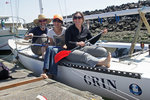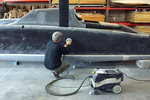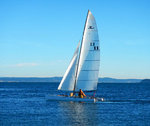Excitement is building around the Race to Alaska, a 750-mile engineless-boat race from Port Townsend, Washington, to Ketchikan, Alaska.
The winner gets $10,000. It's steak knives for the …
This item is available in full to subscribers.
We have recently launched a new and improved website. To continue reading, you will need to either log into your subscriber account, or purchase a new subscription.
If you had an active account on our previous website, then you have an account here. Simply reset your password to regain access to your account.
If you did not have an account on our previous website, but are a current print subscriber, click here to set up your website account.
Otherwise, click here to view your options for subscribing.
* Having trouble? Call our circulation department at 360-385-2900, or email our support.
Please log in to continue |
|




Excitement is building around the Race to Alaska, a 750-mile engineless-boat race from Port Townsend, Washington, to Ketchikan, Alaska.
The winner gets $10,000. It's steak knives for the second-place finisher.
"The race is full of challenges," said Jake Beattie, executive director of the Northwest Maritime Center, sponsor of the big event.
"There are challenges of nature; it is a pretty remote stretch of coast with huge tides, unpredictable weather, fog, shipping traffic. Tons of bears.... There are human challenges as well ... fatigue, hypothermia, injury that happens over a long trip like that."
More than 30 boats have registered for the race, which is open to boats of any size or design or number of crew.
At least six boats have been designed and built just for R2AK.
Registered participants range from high-performance racing sailboats to traditional wooden rowboats; one team is to race a 17-foot Swampscott dory.
High-performance multihulls are the norm, but there’s also one person racing on a 19-foot custom stand-up paddleboard. (See list of participants.)
FIRST, QUALIFY
About 64 boats are set to take part in stage 1 of the journey, a 40-mile crossing of the Strait of Juan de Fuca to Victoria, British Columbia, on June 4. Stage 1 serves as a qualifier for the 39 teams signed up to race to Alaska.
Teams that make it to Victoria, without help, by 5 p.m., June 5 may proceed to Ketchikan, in stage 2, starting at noon on June 7. Racers must also check in at two waypoints farther north: Seymour Narrows and Bella Bella.
"We expect people not to qualify," Beattie said. There is a race-specific safety management system – a sweep boat – on the PT-Victoria leg only.
"Race boss" Daniel Evans of Port Townsend is organizing and coordinating safety and logistics. Teams must carry Coast Guard–required equipment, including a VHF radio, sound signal, navigation lights, lifejackets and flares.
Teams must be unsupported, meaning no support boats or previously set-up food drops are allowed. They may stop and get help, just nothing prearranged.
"Whatever you do has to be available to the other racers, too," state the race rules at r2ak.com.
"Already, people are talking more about PT" because of the race, Beattie said. It was on the front page of the Seattle Times a few months ago; National Geographic considered sending a reporter, and other magazines are "embedding" writers on the crews of two teams: Outside magazine is with Team Sea Runners on a custom 17-foot catamaran with a wingsail sprit rig, and someone from Sail Magazine is with Team Pure and Wild, a Paul Bieker–designed proa. (Race rules stipulate crew may be subtracted, but not added.)
DOWNTOWN RUCKUS
The first weekend in June is already a busy one for Port Townsend, with the 32nd annual Classic Mariners Regatta on June 5-7, and perhaps 300 European-made automobiles arriving by June 6 for the Achtuning Port Townsend Cruise car show.
"There's at least 120 people in the race, and they're going to be bringing friends and family," Beattie said.
Everyone is welcome to a free, informal "boat show" downtown on Wednesday, June 3, as boats are to assemble, register and be on display that day on Water Street near the Maritime Center.
Water Street is to close between Madison and Monroe at 9 a.m., June 3 for the boat show and “Pre-Race Ruckus,” a free party open to all, with a beer garden, food vendors and music by Dirty Beat Duo starting at about 5 p.m. and ending at about 8 p.m.
"It's going to be about as chaotic as the race itself," Beattie joked of the Ruckus. "It's a fun way to welcome the racers to our community," and is also for "people interested in meeting some of these skillful lunatics" who plan to race.
A few of those teams are local. Here are some of their stories.
TEAM TURN POINT
Brandon Davis, owner of Turn Point Design, designed the 24-foot catamaran he’ll race with Nigel Oswald of Friday Harbor.
The Turn Point 24 was built by Davis and his four employees as a "side project," Davis said. “We saw the [Race to Alaska] and just couldn’t help ourselves,” Davis said. “It’s a pretty cool event.”
Davis knows the waters; he's sailed and kayaked the route, worked as a kayak guide in Ketchikan, and ran a sailing and charter business in the San Juan Islands. Oswald, his teammate, "is more of a performance racing sailor," Davis said.
They'll carry freeze-dried food and 10 gallons of water and "might bum water off cruising boats ... as long as it's not someone we know," he said, or find streams to replenish their water.
Team Turn Point's sponsors include EcoPowerShop, Cascade Designs, Kings Marine and IO Integration.
Davis had already been thinking about his boat's design, but scaled it down for the race. The "totally overbuilt" hull weighs 450 pounds, driven by a 350-square-foot mainsail, plus two jibs and a screecher – a type of flat-cut genoa. The cabin is about the size of a two-person backpacking tent. From two recumbent bicycle seats, the crew can operate twin pedal drives, with bicycle cranks turning 14-inch propellers.
The hull is built of surplus aerospace materials: carbon-fiber pre-preg, so named because “it already has the resin in it and you have to cook it in an oven with a vacuum.”
They got it cheap from an aerospace supplier because it was beyond its use-by date, Davis said. “They were literally going to landfill this stuff. We picked up a whole truckload.”
Sandwiched between that thin, hard shell is lightweight honeycomb, which comes in sheets about a half-inch thick.
“The honeycomb is Boeing surplus. They couldn’t sell it. We made a lowball offer and got it for nothing … 750 sheets for the price of one sheet.” Gesturing to several enormous cardboard boxes stashed on high shelves in the workshop, he said, “We have enough material on hand now to make 20 boats.”
They spliced together a broken 34-foot mast, which is "carbon fiber, from an F-25C racing trimaran."
New mylar laminate sails are being made by Florida sailmaker Randy Smyth. "He's known for making sails for the Everglades Challenge," an event similar to R2AK, Davis said.
He said Team Turn Point's closest competitor is probably Team Pure and Wild: Joe Bersch and Dalton Bergan sailing a proa designed by Paul Bieker with help from Russell Brown of Port Townsend. A proa is a one-hulled vessel with a windward outrigger. The boat "shunts" instead of tacking – the sail flips around, the bow becomes the stern and vice versa; it has rudders at both ends.
Pure and Wild also has a pedal drive, Davis said, and has a similar length, weight and sail area to the Turn Point 24.
"The only thing is, they're world-class sailors, and I'm sort of a hack," Davis said. "If we break something in the first three days, I'm kind of, like, whatever. I just want to be part of it."
TEAM HEXAGRAM 59
Another local team calls itself Hexagram 59 after a character from the I Ching that means “wind above, water below.”
Piper Dunlap, a Port Townsend acupuncturist, said the character also includes disillusion, adversity and ultimate success.
Dunlap is also an avid sailboat racer and NWMC board member.
He and Norton Smith of Ashland, Oregon, plan to race in a Hobie 20 catamaran called Ketchikat, built in the early ’90s. It has an “almost-new” mainsail and jib, and Dunlap is assembling a new spinnaker that arrived in 22 pieces. “You save a bunch of money if you assemble it,” he said.
The design's top speed is probably 25 knots, Dunlap said, but they’ll have some extra weight aboard, including “a hydrocycle, an off-the-shelf pedal drive designed for kayaks." They built a carbon-fiber and wood cassette, the long box that holds the pedal drive within a centerboard trunk. “You can kick it up and get it out of the water while sailing,” Dunlap said. “We can go 3.5 knots under pedal power.” They can also paddle in a seated or kneeling position.
“This race, from year to year, will be won by different kinds of boats depending on the weather,” said Dunlap, who expressed some confidence in their chances of winning, given the right weather.
They’ll carry 100 pounds of gear and 40-50 pounds of “furniture” – two waterproof boxes and some racks to tie their waterproof bags to.
“The con of this boat is we don’t have a cabin. We’re very exposed. There’s no way of getting out of the weather. We have to rely on very good high-tech clothing,” Dunlap said. They’ll have one bivy tent for sleeping.
They plan on two warm meals of freeze-dried food a day. They’re also sponsored by Mt. Townsend Creamery. “We’re going to be the cheese boat. We’ll have lots of cheese … high in fat and high in protein and it kind of keeps you warm.” They’ll also have homemade pemmican, made of dried meat, nuts and dried fruit. They’ll bring 6 gallons of water, estimating that to be a third of their needs, and plan to stop twice to refill on water.
They also have a battery with 20 amp hours, two solar panels to recharge it and some ion batteries to recharge devices (tablet or phone). They’ll carry laminated paper charts and “a bunch of very small-print, detailed information about where to go to get what” on laminated paper, “and a pair of very strong reading glasses,” Dunlap said.
Their other sponsor is the PT Athletic Club, which gave Dunlap four free months of membership to get in shape for the race.
“We pretty much have it together,” he said. “I get butterflies whenever I think about it.”
TEAM GRIN
Team Grin, a group of former tall ship and longboat sailors, is racing to Alaska in an Etchells 22, a 30-foot racing sailboat to which they're adding two sliding-seat rowing stations.
The crew is Jeremy Lucke and Jullie Jackson, who are engaged to be married, and Hannah Viano – a social dynamic made much of in the team bio on r2ak.com.
"We really need three wheels," Jackson said. "You've gotta go 24/7."
The team name comes from the boat, which they bought specifically for this race. It was called Gringo, but they changed the name to Grin, erasing the second "G" and turning the "O" into a smiley face.
"I don't really have that big of a competitive streak," Jackson said. Like her teammates, she grins a lot.
Lucke and Viano met as former Outward Bound instructors – leading teenagers and adults on open-boat adventures. Jackson and Lucke met while working in Rockland, Maine, for the Sea Education Association.
"I've sort of had this professional boat crush on Jullie Jackson ever since September 2005," Lucke said.
The couple now work as senior marine technicians for the U.S. Antarctic Program. Viano has also worked in Antarctica, but now she's a children's book illustrator; a recently published book happens to be called "Arrow to Alaska," a fitting title; the Etchells is a long, narrow boat that simply looks fast.
Why race to Alaska?
"Why not?" Jackson said. "This is a really cool idea. The outcome is totally unpredictable."
"Early on, Jake [Beattie]'s goal was to show you can go out on the water and have a great adventure, and it doesn't have to be that expensive," Lucke said.
Jackson concurred. "There are perceived barriers" to on-the-water adventures, but they're more accessible than is widely believed, she said.
Team Grin is sponsored by Hungry Hikers, a freeze-dried backpacking food company. "Hungry Hikers – not just for hikers!" Lucke said.
They're still debating how much water to bring. "That's top secret," Lucke said. "This is a heavy debate," Jackson said. Viano let slip that "15 [gallons] has been tossed around" as an idea. They plan to test how the boat sails with more weight before deciding.
Viano said she sailed an Etchells in Seattle to get a feel for the design. "It sailed really fast," she said. "This is crazy, but not unsafe crazy." She had to remind herself that Lucke and Jackson "are really sensible people." She described herself as "an old, slow, wooden-boat person."
She's excited to "have the challenge be a visceral one," with weather and physical exertion, rather than the usual challenges of "did you get the dishes done and walk the dog."
Viano noted that few women are signed up for R2AK, and "that horrified me, especially in PT, with so many amazing women mariners."
Jackson said she's seeking "a little bit of personal adventure.... I need to push my comfort limits." She wants to reconnect with "simplicity and hard work," and "to go out on the water for fun."